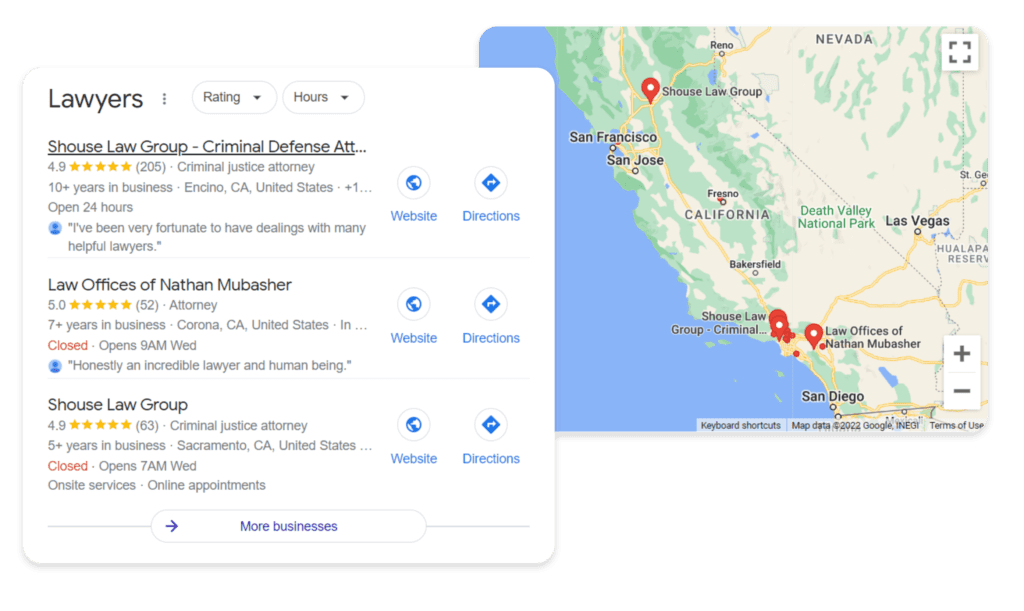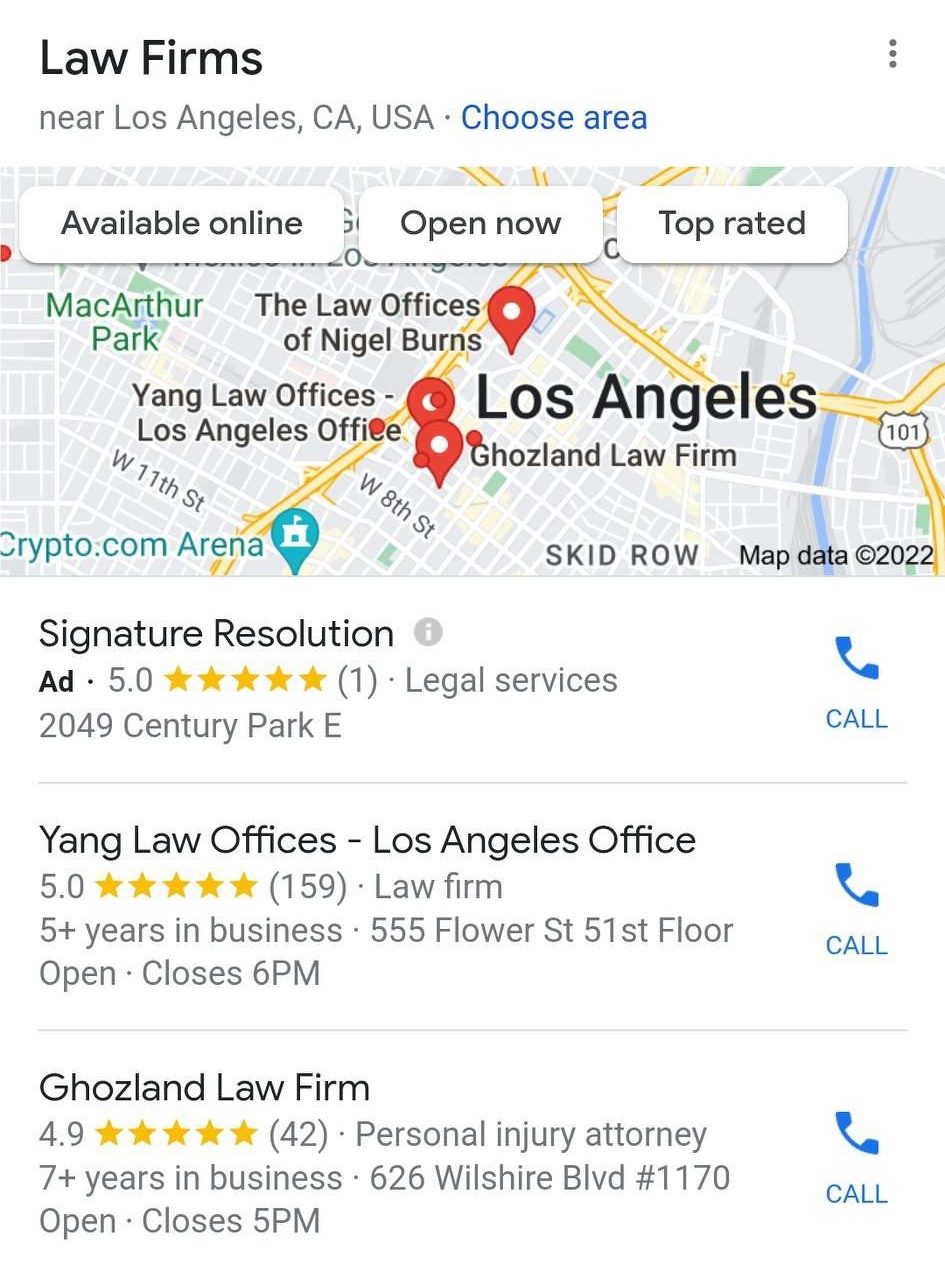What is Reputation Management, and How Can Your Law Firm Benefit From It?
Have you thought about how your online reviews might affect how people perceive your business? As a lawyer, you’re an advocate for your clients. You ardently plead on their behalf. You’re all too familiar with the requirement to defend your client’s reputation or the validity of their case. But what about your law firm’s reputation? In this blog post, we’re going to discuss the importance of reputation management in the online space and how it can help you gain new clients, recruit great talent, and improve your business overall.
How do prospective clients find you online and how do they decide whether they make the potentially life-changing decision to entrust their case to your firm? What do they see at first glance when crossing your website or social media presence after searching the web for legal counsel? Your website and marketing tell the story of your competency, commitment to client success, and legal experience, but if potential clients are unable to verify that through positive reviews and ratings by the past clientele on platforms like Google or Yelp, they may render a verdict in favor of another law firm for their business. Only one bad review found online could dissuade a potential client from doing business with you. According to a 2022 report done by ReviewTrackers 94% of consumers say a bad review has convinced them to avoid a business! That is why managing your firm’s reputation is of utmost importance to grow and maintain your client base.
What is Reputation Management?
In short, reputation management is the practice of ensuring that the reputation – or what potential clients think of your firm – matches as closely as possible to the character of your firm, which is the true legal capability, service, and experience it provides. While people still talk about their experiences with friends, families, and coworkers offline, the recent pandemic and the rapidly evolving technology of today means your reputation to the outside world is primarily established and maintained virtually. Because of this, reputation management refers more specifically to the deployment of technical tools and services to help your future clients find you and the positive things people are saying about their experience with your firm online. Reputation management also refers to mitigating the impact of negative reviews and assists in promptly resolving the concerns of those who are voicing them in publicly accessible internet venues.
“63.6% of consumers check Google before visiting a business.”
-ReviewTrackers
How Reputation Management Works and The Benefits It Provides to Your Firm
So, you understand the primary goal of reputation management is ensuring the public’s perception of your firm is in accord with its true character of it – but how is online reputation management done and what benefits does it provide to your business?
The Benefits of Assessing Your Current Online Reputation
The first key aspect of successful reputation management online is implementing systems that provide visibility into your current online presence concerning reviews. Much like establishing your client’s background and understanding the basic details of their case lay the groundwork for success in litigation, you must first assess what your firm looks like to potential clients online. Businesses that assist firms in gaining a baseline understanding of their current reputation online provide insight into both the quality and quantity of reviews as well as the platforms on which they are voiced. Understanding where people are talking about your business can allow you and your marketing team to manage your reputation appropriately. 85.5% of all internet searches occur on Google and 63.6% of consumers check Google before visiting a business. If you learn your Google Review count is low, you can focus growth efforts there. Likewise, knowing that your negative reviews are primarily on Yelp will ensure you or your reputation management team are more active in monitoring and responding to reviews on that platform. Knowing where to advertise, where to grow, and where to monitor can help your firm financially by increasing the number of clients without overspending on shotgun digital marketing techniques that do not efficiently convert online traffic to a physical business. A study done by the Harvard Business School found a direct correlation between the number of stars a business held on Yelp and the amount of revenue increased by gaining each additional star (5-9% per star), which is another strong indicator that reputation management is a necessity for your firm’s financial wellbeing.
The Benefits of Google Optimization and Organic Review Increase
The next component of online reputation management after completing an initial assessment and understanding where your firm excels and where it can improve is focusing on growth or increasing the positive reputation of your business.
Good or bad, Google is the main arbiter of your reputation – which means focusing growth efforts on their platform is a vital part of managing the reputation of any firm. Google “zero-click searches” present an answer to search questions right from the first page of Google. They can even list businesses (such as law firms) for an answer to certain questions. This means users searching “local attorney” or “attorney near me” on their mobile device can find info about firms (and their rankings and reviews) without clicking a single web page. While simple steps like claiming your Google Business page are critical in managing your reputation online, the driving factor in potential clients finding your firm’s name on top of their local search results page (such as the Google 3-Pack) is the quantity, quality, and average rating of your reviews.


The more Google reviews your firm accumulates, the higher the chance your business will be displayed in the “Google 3-Pack”, which are the top results Google provides for local businesses matching the searcher’s criteria and displays their GPS location on a Google maps widget embedded on the search page. While the greater number of reviews the better, there are certain criteria to aim for to solidify your reputation on Google. Roughly 50% of people trust reviews online as much as a referral from a friend, which is down from 79% just two years ago according to BrightLocal. The lack of trust can be attributed to companies purchasing fake reviews. Reviews that are over-the-top in praise, lots of reviews with similar content, or many reviews with obvious pseudonyms or unverifiable profiles top the list of suspicious criteria. This is where organic reviews that offer realistic positive feedback from verified clientele are critical to converting searches to business.
Professionals in online reputation management will know how to assist you in receiving real reviews from your clients, organically solidifying your reputation. This is achieved through creating more opportunities for your clients to leave you feedback, like providing QR codes, or politely prompting through text or email reminders. Letting professionals worry about your Google statistics and facilitate organic growth to bring more clients in seeking your services will free up your time to focus on achieving success in their case (61% of positive reviewers are motivated by above and beyond service).
Benefits of Responding to Negative Reviews
Although you provide your best legal counsel to all of your clients and can have your reputation management professionals provide convenient opportunities for them to attest to your service online, there is no way to guarantee a negative review will not be left somewhere for the world to see. Like most problems, perceived negative outcomes by clients usually come down to a lack of communication or inappropriate expectations. Responding to negative reactions provides both an opportunity to resolve the user’s concerns (which can potentially turn a bad experience into a future repeat client) and have a positive impact on your firm’s reputation. According to ReviewTrackers, 45% of people are more likely to do business with a company that responds to negative reviews. Successful reputation management professionals provide your firm with monitoring tools to identify these reviews as soon as they hit the web, which is important considering 53% of consumers expect a response to a negative review within 1-3 weeks. Reputation management solutions can benefit your firm by identifying these reviews and coaching you on how to respond to them appropriately, or can even respond for you if you need to focus your efforts on client cases or daily operations at your firm.
“45% of people are more likely to do business with a company that responds to negative reviews.”
-ReviewTrackers
Successful reputation management does not involve the removal or suppression of bad reviews. Not only is this practice extremely unethical, but counterproductive to your firm’s reputation. Google themselves has identified that a mix of both good and bad reviews contributes to the trustworthiness of your firm, which can have implications even greater than the number of new clients seeking your help.
Professional Benefits of Reputation Management
While most businesses tend to engage in reputation management online to increase site traffic and revenue, your firm’s reputation is also on display to more than just potential clients. Your image online is also visible to potential employees, your peers, and your competitors. Considering that 84% of those applying for a position state the reputation of the business is important, ensuring your public reviews are well managed, including employer reviews sites like Glassdoor is critical to getting talented and driven individuals into your firm. Your peers in the legal community also have access to see what others are saying about you online. Whether they are seeking to consult with your firm or potentially oppose you in court, how your firm is talked about online can alter their perceptions. Your online reputation is looked on by peers in a similar manner to your punctuality at meetings or your choice of vocabulary in verbal or written communications. Another important factor to consider is that 97% of businesses say online reputation management is important, as reported by Forbes. That means there is only a 3% chance competitor firms are not thinking about managing their online reputation or utilizing software or professionals to do so. Reputation management, especially done by professionals not only attracts the right candidates for your firm but projects a professional image to your peers and ensures you are competing against other local firms for prospective clients.
In Summary
Reputation management ensures your online reviews match the true character of your firm. Establishing your business as trustworthy, competent, and experienced is of utmost importance to consumers, and it can make or break your marketing efforts. Understanding what people are saying about your business can also shape your marketing strategy and improve your business operations – including attracting better talent.
We learned that quantity, quality, and newness of reviews can help your firm rank higher in the Google 3-Pack. We also covered how a negative review isn’t the worst thing in the world – it can be an opportunity to build loyalty and demonstrate exceptional service. Negative reviews also show authenticity, however; consumers now expect every negative review to receive a prompt response.
We hope you learned about the importance of reputation management and how it can benefit your law firm. We’re “firm” (pun intended 😁) believers in it. That’s why we at Forerunner have partnered with ReviewTrackers to include reputation management for all of our clients. Want to see what we can do for your reputation? Simply book an appointment – we’d be happy to design and manage a review capture and handling strategy that’ll help you rank higher so you can serve more clients.
